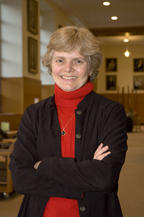There are many barriers to successful agricultural research in the developing world, but Cornell University s Albert R. Mann Library has found an intervention point: access to information.
The Essential Electronic Agricultural Library (TEEAL) is a digital library of full-text journal articles started with a 1997 grant from the Rockefeller Foundation. Wallace and Jan Olsen, former Senior Research Associate and Director of Mann Library, respectively, conceived the idea, believing strongly that the long-term improvements of agricultural development relied on access to current research.

Mann Library Director
At that time most of the agriculture libraries in the developing world had many challenges. The journal subscriptions were few and far between, and many of their books were donated and old. They didn t have the resources they needed, says current Mann Library Director Mary Ochs.
The platform was designed to cater to institutions without Internet access. TEEAL could be used as a self-contained information system, originally housed on 450 CD-ROMs. According to Ochs, This was the same technology we were using in Mann Library. We were shipping current technology to the developing world.
The library in a box is made available to institutions in eligible countries because of a strong public-private partnership between donors, Cornell University, and publishers. Currently TEEAL is funded by a generous grant from the Bill and Melinda Gates Foundation. It is clear that the publishers are making a tremendous contribution by providing their content for free. And then most of our costs at Cornell are covered through grant funding, Ochs says. TEEAL charges a small fee to purchase a subscription, in order to keep systems up to date with both rapidly evolving information technology infrastructure and scientific research.
Initiatives such as Access to Global Online Research in Agriculture (AGORA) and Research4Life provide similar services for scientists with Internet access. We really thought TEEAL wouldn t be needed after about 2007. The idea was to transition everyone to AGORA for up-to-date access, Ochs adds. But we keep getting feedback from institutions that we work with saying they still need the offline access. TEEAL will never convert itself to online journal access, but it will convert its clients to AGORA as they gain increased access to Internet.
Ochs stresses the importance of researchers around the globe having access to scientific literature in their fields. High quality research provides an opportunity for developing world voices to be heard, she says. We were working on this before Cornell President David Skorton called Cornell the Land Grant University to the world, and that said it all. Connected with Mann Library s vision that access to agricultural information is critical for Cornell students and faculty researchers, that same vision was also critical for research in the developing world.
Ochs concludes: Researchers in the developing world have many challenges. They have funding issues, their laboratories aren t always adequately equipped, and sometimes even electricity is still an issue. I can t solve their lab problem, their electricity problem or their funding problem, but I can help solve their information problem.
